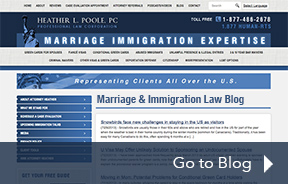Lying to Immigration – The potentially PERMANENT problem to obtaining your Green Card
Waivers for Non-Permanent Residents:
When you are applying for permanent residency (green card) or an immigration benefit of any kind, intentionally concealing the truth from or knowingly lying to an immigration or a consulate officer could result in a misrepresentation finding. If CIS or the Department of State consulate officer believes you committed misrepresentation, this is a life-time bar to receiving any immigration benefit (regardless of whether you otherwise qualify for permanent residency or a visa). Lying on forms, using someone else’s passport to enter the US, using a fake passport to enter the US . . . these are all examples of potential misrepresentation findings.
The only way around a misrepresentation finding is filing a waiver with CIS. Waivers are a big undertaking and should be taken very seriously, be well documented, and indicate that the immigrant applying for the waiver deserves CIS discretion to waive the past lie.
Warning about I-601A Provisional Waivers: Currently the provisional I-601A waiver program does not allow waivers for misrepresentation! If you have triggered an unlawful presence bar (3 or 10 year bar) and also lied to gain entry into the US, you are not eligible for the I-601A provisional waiver program but must seek a traditional I-601 waiver (i.e., wait outside of the US until USCIS makes a favorable determination in your case). This is crucial point to understand – don’t waste your money – consult with a competent attorney before filing any waiver application!)
So, who can qualify for a waiver?
For a waiver to be approved, the immigrant must have a “qualifying relative.” This means that the immigrant must have either a U.S. citizen spouse, or U.S. citizen parent or a U.S. lawful permanent resident spouse or parent who would suffer “extreme hardship” if the immigrant is not allowed to re-enter the U.S. There is also a special exception for battered spouses. Note, that children are not considered qualifying relatives for the waiver unless you have an approved VAWA (abused spouse) self-petition.
Learn More About Real People Like You Who Trusted Us with their Misrepresentation Waiver Case:
Click Here to Read About the Couple’s Story: Turkish National Wins Waiver for Misrepresentation Lifetime Bar in Greece
Book Your Appointment to Speak with Attorney Heather About your case: Click Here.
More About What it Takes to File a Waiver Case . . .
What is extreme hardship?
The key term in the provision is “extreme” and thus, only in cases of real actual or prospective injury to the United States national or lawful permanent resident parent or spouse will the bar be removed. Common results of the bar, such as separation, financial difficulties, etc., in themselves are insufficient to warrant approval of an application unless combined with much more extreme impacts. Applicants are encouraged to submit as much documentary evidence as possible proving that failure to receive the waiver requested would result in extreme hardship to your US citizen spouse or parent.
Consulates differ on what factors in a case are more persuasive than others. The largest consulate in the world with the most waiver applications is Ciudad Juarez, Mexico. As of 2005, the CIS office attached to this consulate, considered the following as types of factors that are relevant to deciding whether the US citizen parent or spouse will suffer “extreme hardship” (the consulate will also consider other factors, not listed here):
a. HEALTH – Ongoing or specialized treatment requirements for a physical or mental condition;availability and quality of such treatment in your country, anticipated duration of the treatment; whether a condition is chronic or acute, or long-or short-term.
b. FINANCIAL CONSIDERATIONS – Future employability;
loss due to sale of home or business or termination of a professional practice;
decline in standard of living;
ability to recoup short-term losses;
cost of extraordinary needs such as special education or training for children;
cost of care for family members (i.e., elderly and infirm parents).
c. EDUCATION ?
Loss of opportunity for higher education;
lower quality or limited scope of education options;
disruption of current program;
requirement to be educated in a foreign language or culture with ensuing loss of time for grade;
availability of special requirements, such as training programs or internships in specific fields.
d. PERSONAL CONSIDERATIONS ?
Close relatives in the United States and /or your country;
separation from spouse/children;
ages of involved parties;
length of residence and community ties in the United States.
e. SPECIAL FACTORS ?
Cultural, language, religious, and ethnic obstacles;
valid fears of persecution, physical harm, or injury; social ostracism or stigma;
access to social institutions or structures.
__________________________________________________________________
How does the traditional misrepresentation waiver process work?
Here’s Attorney Heather’s short presentation explaining the process and what to expect for a traditional I-601 waiver:
“Preparing For the Road Ahead: Understanding the Process & Timing in Traditional I-601 Waiver Cases”
__________________________________________________________________
New! Heather’s updated Frequently Asked Questions & Answers about Waivers
WARNING: An attorney or a consultant who says s/he can get you this waiver for $1500 and does not take the time to find out the specifics of your immigration history, your spouse’s history and talks about these factors with you to see how strong your waiver argument(s) could be, is not the right attorney for you. Are you going to feel confident that your future together has the best chance with someone who won’t give you an in-depth evaluation? Waivers take a lot of work and time to compile; $1500 is an extreme low quote and indicates that the attorney is not going to spend the necessary time preparing your case. Be careful.
Contact us today to find out if you are eligible for a waiver and the chances of a waiver being approved (if Heather is your attorney) in your case! There are many different factors that consulates consider and waiver cases are big undertakings – Don’t run out of time to make a strong case.
Heather has a VERY HIGH APPROVAL RATE on waiver cases, with waiver approvals from some of the world’s toughest CIS offices
(including Lima, Peru– handling South American countries, Moscow, Russia – handling former Soviet Union countries and Bangkok, Thailand – South Asia, Australia), as well as 99% approvals on Mexican cases (as of 6/10)* with only 1 case ever placed in the backlog. She has experience with consulates all over the world.
Book Your Appointment to Speak with Attorney Heather About your case: Click Here.
__________________________________
Misrepresentation and Fraud Waivers for Permanent Residents (Green Card holders) and Abused Immigrants
For permanent residents now in removal proceedings due to have committed fraud to obtain their residency (green card), a waiver for the fraud is available in many circumstances if the immigrant is not barred from keeping their green card for any other ground besides the fraud. A waiver is also available to Violence Against Women Act self-petitioners who do not have to be permanent residents to obtain the waiver. If the waiver is approved, the permanent resident cannot be removed due to fraud (even if the LPR received their permanent residency status due to marriage fraud).
So, who can qualify for a waiver?
The waiver requires:
(1) The immigrant must have a US citizen or LPR (lawful permanent resident) spouse or US citizen or LPR parent or US citizen or LPR child (NOTE: children are not qualiyfing relatives for the misrepresentation waiver available to non-permanent residents);
(2) The immigrant possessed an immigrant visa or equivalent document at the time of admission; and
(3) Were otherwise eligible for a green card at the time of admission if not for the fraud.
This is a discretionary waiver that can only be filed in front of an immigration judge who will weigh many factors based on caselaw to determine if the immigrant should be granted the waiver and dserves to be granted the waiver.
Contact us today to find out if you are eligible for a waiver and the chances of a waiver being approved (if Heather is your attorney) in your case! There are many different factors that consulates consider and waiver cases are big undertakings – Don’t run out of time to make a strong case.
Book Your Appointment to Speak with Attorney Heather About your case: Click Here.






